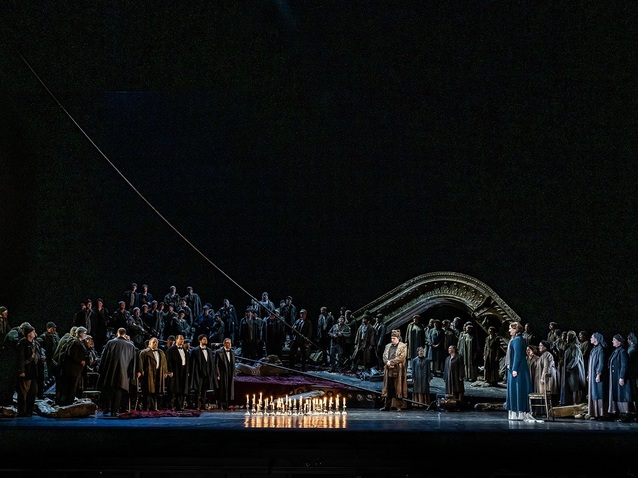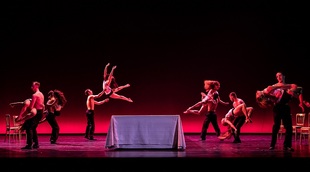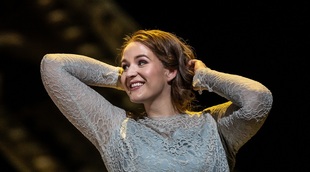 © Clive Barda
© Clive Barda
Following Der fliegende Holländer, Tannhäuser, which premiered in 1845, is acclaimed as Richard Wagner’s second mature opera and, set in thirteenth century Germany, tells of the eponymous minstrel-knight. Feeling that the world does not understand his art as a singer, he has fled to Venusberg where he enjoys the love of Venus. After being there for a while, however, he becomes restless and longs for his former life, and especially Elisabeth who he left behind. A mortified Venus pointedly asserts that one day he will be only too eager to return to her, but Tannhäuser insists this will never happen and succeeds in escaping her clutches when he declares that his salvation rests in Mary.
Tannhäuser is subsequently reunited with his old friends, and returns to his homeland of the Wartburg where he enters a song competition. The task is to present a song that explains the nature of love, and Elisabeth will award the winner any prize he wishes. While the other contestants all compare love with fountains of pure water or see it as something chaste, he keeps interjecting that only he knows true love, which equates to the carnal delights he enjoyed with Venus.
Everyone is horrified at the sins he has just confessed to committing, and only Elisabeth’s intervention prevents them from attacking him. The Landgrave of Thuringia then orders Tannhäuser to go on a pilgrimage to Rome, but when he does so even the Pope proclaims it would take a miracle to save him from eternal damnation. In despair Tannhäuser considers returning to Venus, but then news arrives that Elisabeth has died. In the process, she has realised the miracle that was required to save Tannhäuser’s soul, so he goes to his own death knowing her depth of love for him.
After what is known as the Dresden version premiered in 1845, Wagner produced a second version for Paris in 1861. This, among other things, saw the text translated into French and introduced a ballet, albeit in Act I so that the bacchanal could portray Venusberg rather than Act II as grand opéra dictated. Wagner revised it further for Vienna in 1875, and most, although not all, productions today represent a combination of the Paris and Vienna versions and are performed in German. It seems that Wagner remained dissatisfied with the work, proclaiming three weeks before he died that he still owed the world a Tannhäuser, but it is difficult to share in the composer’s sense of failure when the opera is such an obvious masterpiece in possession of some extremely moving moments.
The real coup in Tim Albery’s 2010 production for the Royal Opera, now enjoying its second revival, comes at the very start as the ballet in the Overture and Scene I is brilliantly rendered. Wagner’s original stage directions describe an ‘Arcadian’ landscape with grottos and waterfalls that contain naiads, nymphs and cupids, and, while that vision is not reproduced literally, its spirit is captured extremely well. Without being explicit in any way, choreographer Jasmin Vardimon’s routine successfully suggests the act of love making. With the rushes of activity and falling away matching the climaxes and ‘lulls’ in the music, the enjoying of carnal delights is made to feel exhilarating and celebratory as it would be in Venusberg.
Sadly, the rest of the production does not quite live up to the promise of this beginning as Albery uses stages as a metaphor for artifice. In Michael Levine’s sets, the Venusberg is presented as a smaller version of the Royal Opera House stage, which means that when Tannhäuser leaves the goddess the curtain, quite literally, falls on her. When he is accepted back into the fold by his friends this stage area appears again, but this time it seems to represent the Wartburg. The suggestion is that both places are capable, in their different ways, of offering stability and a sense of belonging, but just as Tannhäuser proclaims that mortals can change when gods do not, so it is the proscenium stage representing the Wartburg that crumbles. In Act II it lies as a wreck, and by Act III is in an advanced state of decay. An undamaged proscenium stage descends once more when Venus renews her advances towards the end, but it disappears again implying that anything genuine and true has to be built the hard way from the ground up. In fact, the production’s final moving image reinforces this point by linking it to the miracle that has just occurred.
The desolate, snow ridden landscape of Act III feels appropriate enough because it reflects Wolfram’s sense of unease and Tannhäuser’s total despair, but the staging does not suit Act II. The Entry of the Guests feels lame because, even acknowledging that that is what it is intended to portray, it simply feels as if we are staring at an interminable number of people entering the stage and then placing candles at its centre. This might be because the routine does not seem to possess the same drive as the music, but it may not actually be the fault of the direction at all. A similar pace of movement occurring in a grand Minnesingers’ Hall would have handed the scene an appropriate level of grandeur, and it is only when the setting does not offer this that the movement that occurs within it fails. This problem is symptomatic of a wider difficulty with the staging. Because it is hard for us today to feel that what Tannhäuser has done is so utterly heinous, the staging needs to reveal a society so steeped in religiosity and piety that the severity of his crimes feels obvious. That is easier to achieve when a thirteenth century medieval society is clearly portrayed, and harder to do when a more ‘abstract’ setting is offered up. True, many of the chorus tote guns suggesting a modern dictatorship where ‘morals’ are enforced as a way of controlling the population, but it is still hard to feel we are gazing on a community where the church and salvation count for everything, and we really need to feel this for the opera to have maximum impact.
On opening night Stefan Vinke was ill leading him to act the role of Tannhäuser while Norbert Ernst sang the part with music from the side. There were moments that understandably did not sound as polished as one would have liked, but, considering the extremely short notice he had, Ernst’s performance was quite remarkable. By any measure, a lot of his output sounded very good indeed with his overall tone feeling highly suited to the role. Vinke for his own part silently shaped the words very convincingly, which is no easy task when producing no sound, especially over such a sustained period. The measure of just how strong such a partnership is tends to be dictated by the moment when we forget that the sound is not coming from the person we see on stage, and in this instance that was fairly early in the performance.
Ekaterina Gubanova is a suitably alluring Venus with her mezzo-soprano proving as sumptuous as it is secure, while Lise Davidsen is a revelation as Elisabeth delivering a performance of exhilarating power and persuasion. Gerald Finley is an immensely sensitive Wolfram who ensures that ‘Oh du, mein holder Abendstern’ is one of the undoubted highlights of the evening, and Mika Kares an astonishing Landgrave, such is the strength of his tone and presence. There is also excellent support from Egor Zhuravskii as Walther, Sarah Dufresne as the Young Shepherd and Ólafur Sigurdarson, who replaced Michael Kraus as Biterolf on opening night.
Some of the attention to detail is very good so that during the song competition we see Biterolf attempting to restrain Tannhäuser long before he ultimately interjects, and Walther genuinely congratulating Wolfram on his own song. However, as the scene becomes more heated the confrontations between the principals do not feel as charged as they might, reaffirming the sense that we may be witnessing a set of extremely good soloists as opposed to a cast that gels particularly well. However, the singers do work as one with the orchestra, which under the baton of Sebastian Weigle makes the music feel both coherent and spine tingling because it breathes so easily. The chorus also sounds magnificent, especially in its offstage singing, and the result is many moments that feel exceptionally moving. This Tannhäuser may not be perfect, but this should not detract from the fact there are an enormous number of things to enthuse about, and, after a few more performances to bed it in, it could be a very exciting prospect indeed.
By Sam Smith
Tannhäuser | 29 January - 16 February 2023 | Royal Opera House, Covent Garden
the 01 of February, 2023 | Print



Comments